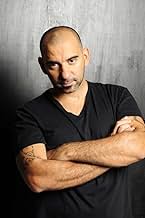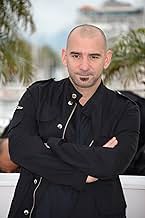CALIFICACIÓN DE IMDb
6.5/10
5.7 k
TU CALIFICACIÓN
Los sacerdotes Julián y Nicolás trabajan incansablemente para ayudar a la gente de un empobrecido barrio en los suburbios de Buenos Aires. A ellos se les une Luciana, una atractiva trabajado... Leer todoLos sacerdotes Julián y Nicolás trabajan incansablemente para ayudar a la gente de un empobrecido barrio en los suburbios de Buenos Aires. A ellos se les une Luciana, una atractiva trabajadora social.Los sacerdotes Julián y Nicolás trabajan incansablemente para ayudar a la gente de un empobrecido barrio en los suburbios de Buenos Aires. A ellos se les une Luciana, una atractiva trabajadora social.
- Dirección
- Guionistas
- Elenco
- Premios
- 1 premio ganado y 9 nominaciones en total
Jérémie Renier
- Nicolás
- (as Jeremie Renier)
Martina Gusmán
- Luciana
- (as Martina Gusman)
Federico Barga
- Monito
- (as Federico Benjamín Barga)
Walter Jakob
- Lisandro
- (as Walter Alfredo Jakob)
Mauricio Minetti
- Cruz
- (as Mauricio Sergio Minetti)
Tatiana Giménez
- Tati
- (as Tatiana Gimenez)
José Gómez
- Domingo
- (as Jose 'Negro' Gomez)
Opiniones destacadas
Argentinean director Pablo Trapero brings to the screen a very dark seemingly hopeless disparity between the rich and the poor. Written by Trapero along with Alejandro Fadel, Martín Mauregui and Santiago Mitre, the story will burn on the viewer's mind the hypocrisy of disparity between the rich and the poor.
The film opens in the Peruvian jungle where Father Nicolás (Jérémie Renier) witnesses the brutal massacre of his friends and congregation while he alone survives, leaving a profound sense of guilt for not having also died in the catastrophe. Father Nicolás's beloved friend and confessor Father Julián (Ricardo Darín) brings Nicolás to the "Villa Virgin", a 'favela' like shantytown in the slums of Buenos Aires near an abandoned huge project for a hospital that was started decades ago in Buenos Aires, seen today as a typical "white elephant", a useless structure that now houses the poverty stricken inhabitants. Drugs provide the major business in this ghetto. Assault weapons and firearms can be found almost everywhere. Add all that to the precarious living conditions and this sort of hell on earth is not even fit for anyone to endure. The two priests work tirelessly to help the local people. Julián uses his political connections to oversee the construction of a hospital. Nicolás remains deeply troubled from his experience in the jungle, but he does find comfort in Luciana (Martina Gusman), a young, attractive, atheist social worker. As Nicolás' faith weakens, tension and violence between the slum drug dealing cartels grows. And when work on the hospital is halted by ministerial decree, the faith of the inhabitants of Villa Virgin is shattered, and Nicolás discovers he has been called by Julián to assume his role of parish priest as Julián is coping with an undiagnosed neurological disease. It is a test of wills, a test of faith, and a sense of being crushed by the politics of Argentina.
Because of the setting in the filthy and decrepit slum the visuals become confusing with the cinematography by Guillermo Nieto attempting to take in too much visual information to the point of confusing the story line. But the musical score by Michael Nyman is brilliant and enhances the film tremendously. The three major actors - Darin, Renier, and Gusman - are outstanding in very difficult roles. If the audience is left with a sense of the futility the people of the slums face daily, then the film has accomplished its mission. In Spanish with English subtitles.
Grady Harp
The film opens in the Peruvian jungle where Father Nicolás (Jérémie Renier) witnesses the brutal massacre of his friends and congregation while he alone survives, leaving a profound sense of guilt for not having also died in the catastrophe. Father Nicolás's beloved friend and confessor Father Julián (Ricardo Darín) brings Nicolás to the "Villa Virgin", a 'favela' like shantytown in the slums of Buenos Aires near an abandoned huge project for a hospital that was started decades ago in Buenos Aires, seen today as a typical "white elephant", a useless structure that now houses the poverty stricken inhabitants. Drugs provide the major business in this ghetto. Assault weapons and firearms can be found almost everywhere. Add all that to the precarious living conditions and this sort of hell on earth is not even fit for anyone to endure. The two priests work tirelessly to help the local people. Julián uses his political connections to oversee the construction of a hospital. Nicolás remains deeply troubled from his experience in the jungle, but he does find comfort in Luciana (Martina Gusman), a young, attractive, atheist social worker. As Nicolás' faith weakens, tension and violence between the slum drug dealing cartels grows. And when work on the hospital is halted by ministerial decree, the faith of the inhabitants of Villa Virgin is shattered, and Nicolás discovers he has been called by Julián to assume his role of parish priest as Julián is coping with an undiagnosed neurological disease. It is a test of wills, a test of faith, and a sense of being crushed by the politics of Argentina.
Because of the setting in the filthy and decrepit slum the visuals become confusing with the cinematography by Guillermo Nieto attempting to take in too much visual information to the point of confusing the story line. But the musical score by Michael Nyman is brilliant and enhances the film tremendously. The three major actors - Darin, Renier, and Gusman - are outstanding in very difficult roles. If the audience is left with a sense of the futility the people of the slums face daily, then the film has accomplished its mission. In Spanish with English subtitles.
Grady Harp
So this was based on a man who ... well that would be a spoiler, but lets say someone who helped people in communities that did not get any help from the state - quite the opposite, they were oppressed. And as the director reveals even under a democratic elected goverment (something you probably can search and find on the internet too).
Those were "insights" I got mostly after watching the movie, but they will not hinder you or take anything away from the movie watching experience. So I knew this was a drama, I just didn't know what this was going to be about. Knowing the main actor (and if you've seen a couple of Argentinian movies you probably know or have seen him too) is one thing, which also means you know how good he is. But it's more the story that will tear you apart and the sacrifices some people do, to help others. It might feel a bit unfocused at times, but the grander perspective is there
Those were "insights" I got mostly after watching the movie, but they will not hinder you or take anything away from the movie watching experience. So I knew this was a drama, I just didn't know what this was going to be about. Knowing the main actor (and if you've seen a couple of Argentinian movies you probably know or have seen him too) is one thing, which also means you know how good he is. But it's more the story that will tear you apart and the sacrifices some people do, to help others. It might feel a bit unfocused at times, but the grander perspective is there
Pablo Trapero's film tells a tough tale set in the slums of South America; but for much of its length, with its focus on community organisation and the struggle of workers to get paid, it resembles less 'City of God' than a Ken Loach movie, and it's not necessarily the worse for that. What is lacks, however, which Loach's movies do not, is a sense of perspective beyond those of those who try to help the slum's inhabitants: we see the story through the eyes of two priests, and a social worker, but not of the slum dwellers themselves. Indeed, the film (which is very watchable) could have been longer: a female gangland boss seems a potentially interesting character, but she only gets one scene, while the question of who is screwing the workers (and whether allies of the Church might actually be involved) is raised by not answered. It's a nice small movie; but one that contains a bigger picture that is never fully shown.
Very good movie excellently performed by Argentina big star , Ricardo Darin . This Cannes selected film contains a fascinating , brooding story , perfectly acted and concerning the narration about the construction a hospital of riveting manner . The "Villa Virgin", a shantytown in the barrios of Buenos Aires. Julian (Ricardo Darin) and Nicolas (the French Jeremie Renier) , two priests and long-standing friends, work tirelessly to help the local people. Julian uses his political connections to oversee the building of a hospital. Nicolas unites him following the flop of a mission he was leading in the jungle , after paramilitary forces assassinated members of the community. Deeply troubled, he finds a little comfort in Luciana (Martina Gusman), an enticing social worker . As Nicolas' faith weakens, tension and violence between the barrio drug dealing cartels grow. And when work on the hospital is halted by ministerial decree , the fuse is lit...
This is a co-production Argentina/Spain/France , being well paced , skillfully edited and very interesting . The picture is plenty of thrills , intense drama , a love story , violence and thought-provoking issues . After splendid collaboration between Pablo Trapero and Ricardo Darin in a thriller titled ¨Carancho¨ , this relationship worked out so well that they're doing it again . Trapero's Elefante Blanco seems like a very likely candidate to turn up in becoming quite simply one of the best films of its year . The insightful storyline relies heavily on the continued relationship among three protagonists but it isn't tiring ; being entertained and with numerous diverting moments and agreeable feeling . Darin and Jeremie Renier star as priests coping in very different ways with the violence and corruption in the Buenos Aires slum of Villa Virgen where they work , both of them carry out excellent performances along with Martina Gusman playing as an atheist social worker . However , Ricardo Darin steals the show as the obstinate priest , Darin is a magnificent leading figure of the most important Argentinian movies such as ¨El Aura¨, "El Faro" (1998), "El Mismo Amor La Misma Lluvia" (1999), "Nueve Reinas" (2000), "La Fuga" (2001) and especially ¨El Hijo de la Novia¨ . Evocative production design filmed on location in barrios and slums from Buenos Aires , Capital Federal and Plaza Guemes . Emotive as well as sensitive musical score by the British Michael Nyman . Colorful and adequate cinematography by cameraman Guillermo Nieto . The motion picture well produced by Alejandro Cacetta and Juan Vera , was compellingly directed by Pablo Trapero . Trapero is a good filmmaker , his best film was ¨Carancho¨, dealing with a slow burning exercise in moral decay and his usual actress results to be Martina Gosman who has worked in various film with him , such as : ¨Lion's den¨ , ¨Nacido y Criado¨ , ¨Carancho¨ and of course this ¨Elefante Blanco¨ . This dramatic flick is an above average film and Argentina's official submission to the Cannes Film Festival and achieved several Awards of the Argentinean Academy. Indispensable and essential seeing for Ricardo Darin fans .
This is a co-production Argentina/Spain/France , being well paced , skillfully edited and very interesting . The picture is plenty of thrills , intense drama , a love story , violence and thought-provoking issues . After splendid collaboration between Pablo Trapero and Ricardo Darin in a thriller titled ¨Carancho¨ , this relationship worked out so well that they're doing it again . Trapero's Elefante Blanco seems like a very likely candidate to turn up in becoming quite simply one of the best films of its year . The insightful storyline relies heavily on the continued relationship among three protagonists but it isn't tiring ; being entertained and with numerous diverting moments and agreeable feeling . Darin and Jeremie Renier star as priests coping in very different ways with the violence and corruption in the Buenos Aires slum of Villa Virgen where they work , both of them carry out excellent performances along with Martina Gusman playing as an atheist social worker . However , Ricardo Darin steals the show as the obstinate priest , Darin is a magnificent leading figure of the most important Argentinian movies such as ¨El Aura¨, "El Faro" (1998), "El Mismo Amor La Misma Lluvia" (1999), "Nueve Reinas" (2000), "La Fuga" (2001) and especially ¨El Hijo de la Novia¨ . Evocative production design filmed on location in barrios and slums from Buenos Aires , Capital Federal and Plaza Guemes . Emotive as well as sensitive musical score by the British Michael Nyman . Colorful and adequate cinematography by cameraman Guillermo Nieto . The motion picture well produced by Alejandro Cacetta and Juan Vera , was compellingly directed by Pablo Trapero . Trapero is a good filmmaker , his best film was ¨Carancho¨, dealing with a slow burning exercise in moral decay and his usual actress results to be Martina Gosman who has worked in various film with him , such as : ¨Lion's den¨ , ¨Nacido y Criado¨ , ¨Carancho¨ and of course this ¨Elefante Blanco¨ . This dramatic flick is an above average film and Argentina's official submission to the Cannes Film Festival and achieved several Awards of the Argentinean Academy. Indispensable and essential seeing for Ricardo Darin fans .
The perfect portray of human hypocrisy. I guess the actual message in this movie is that nothing really ends, nor the struggle for a better life or the evil that keeps people from getting a better life.
Some other reviewer stated this kind of story had already been told... Well has it?. Not this one in particular, I think the characters are quite real. Both main characters and extras have done a wonderful job keeping it real, nothing i have seen in Argentinian films for a while.
The shots are beautiful and seem to capture very well the actual landscape of the "villas". Music on the other hand doesn't live up to the most dramatic moments in the film, and personally I think it could have been improved.
To sum up "Elefante blanco" is definitely a movie to be watched, and mostly a message to be heard.
Some other reviewer stated this kind of story had already been told... Well has it?. Not this one in particular, I think the characters are quite real. Both main characters and extras have done a wonderful job keeping it real, nothing i have seen in Argentinian films for a while.
The shots are beautiful and seem to capture very well the actual landscape of the "villas". Music on the other hand doesn't live up to the most dramatic moments in the film, and personally I think it could have been improved.
To sum up "Elefante blanco" is definitely a movie to be watched, and mostly a message to be heard.
¿Sabías que…?
- TriviaPriest Julian's dedication to the Villa residents bears a striking resemblance to real life Priest of the Villa, Carlos Mugica. Although born into a well off middle class family, Mugica emphasized with the poor in Argentina particularly in Buenos Aires. He preached liberation theology to Villa residents and is hailed as a Third World priest similar to Oscar Romero from El Salvador. Mugica also supported both spiritually and unapologetically the liberation struggles of the poor and revolution students. His political alignment to left wing radical politics (revolutionary) in the 1960s and continued work among the villa's habitants, accumulated in his assassination in 1975.
- ConexionesFeatured in Televisión registrada: Ricardo Darín (2012)
- Bandas sonorasA Satire Against Reason
Written by Michael Nyman
Performed by The Michael Nyman Band
Published by Chester Music Limited
Courtesy of MN Records Limited
Selecciones populares
Inicia sesión para calificar y agrega a la lista de videos para obtener recomendaciones personalizadas
- How long is White Elephant?Con tecnología de Alexa
Detalles
- Fecha de lanzamiento
- Países de origen
- Sitio oficial
- Idiomas
- También se conoce como
- White Elephant
- Locaciones de filmación
- Ciudad Oculta, Villa Lugano, Buenos Aires, Argentina(Elefante Blanco and slum)
- Productoras
- Ver más créditos de la compañía en IMDbPro
Taquilla
- Total en EE. UU. y Canadá
- USD 8,884
- Fin de semana de estreno en EE. UU. y Canadá
- USD 5,098
- 31 mar 2013
- Total a nivel mundial
- USD 4,387,907
- Tiempo de ejecución1 hora 45 minutos
- Color
- Mezcla de sonido
- Relación de aspecto
- 2.35 : 1
Contribuir a esta página
Sugiere una edición o agrega el contenido que falta
























